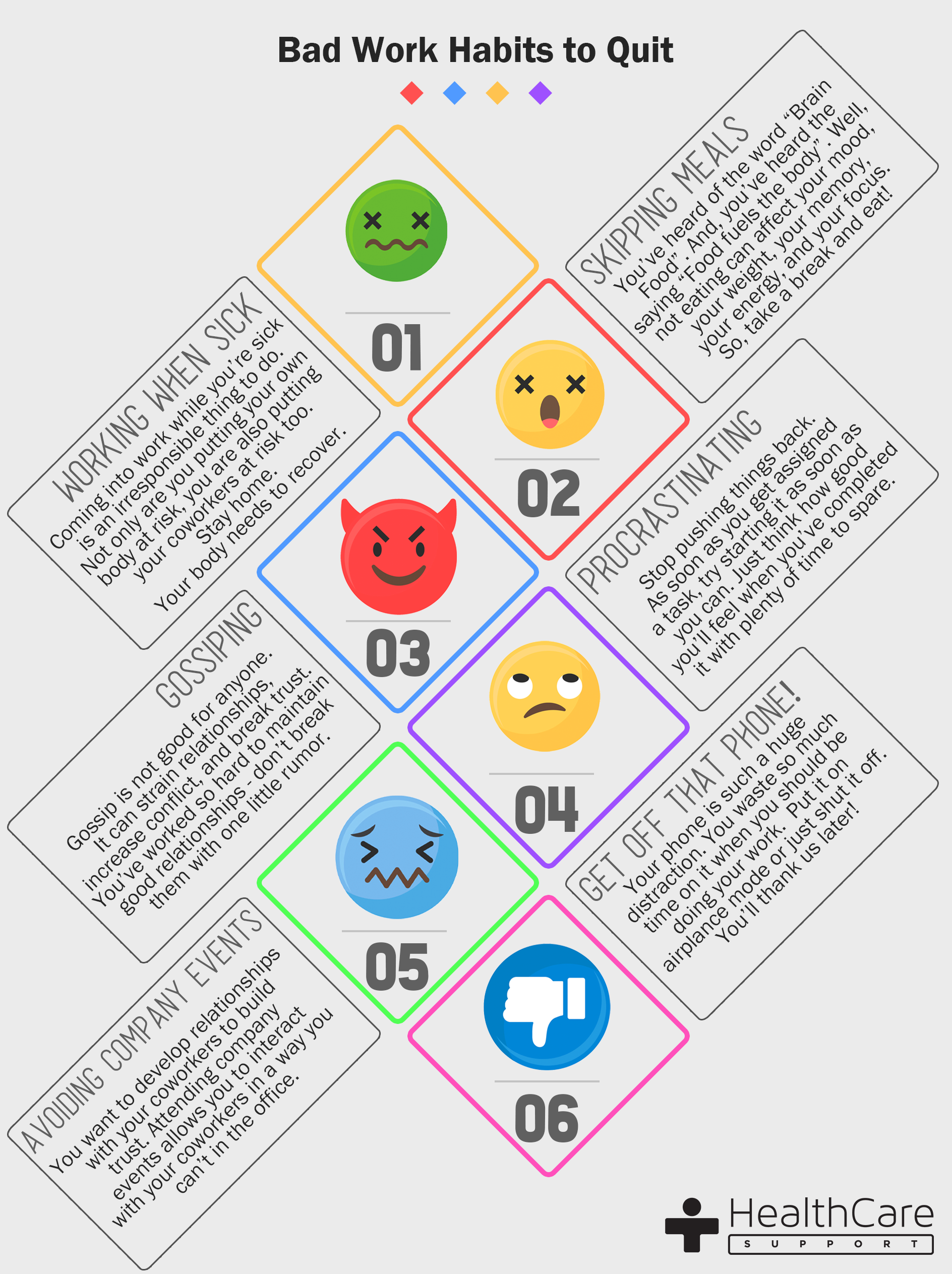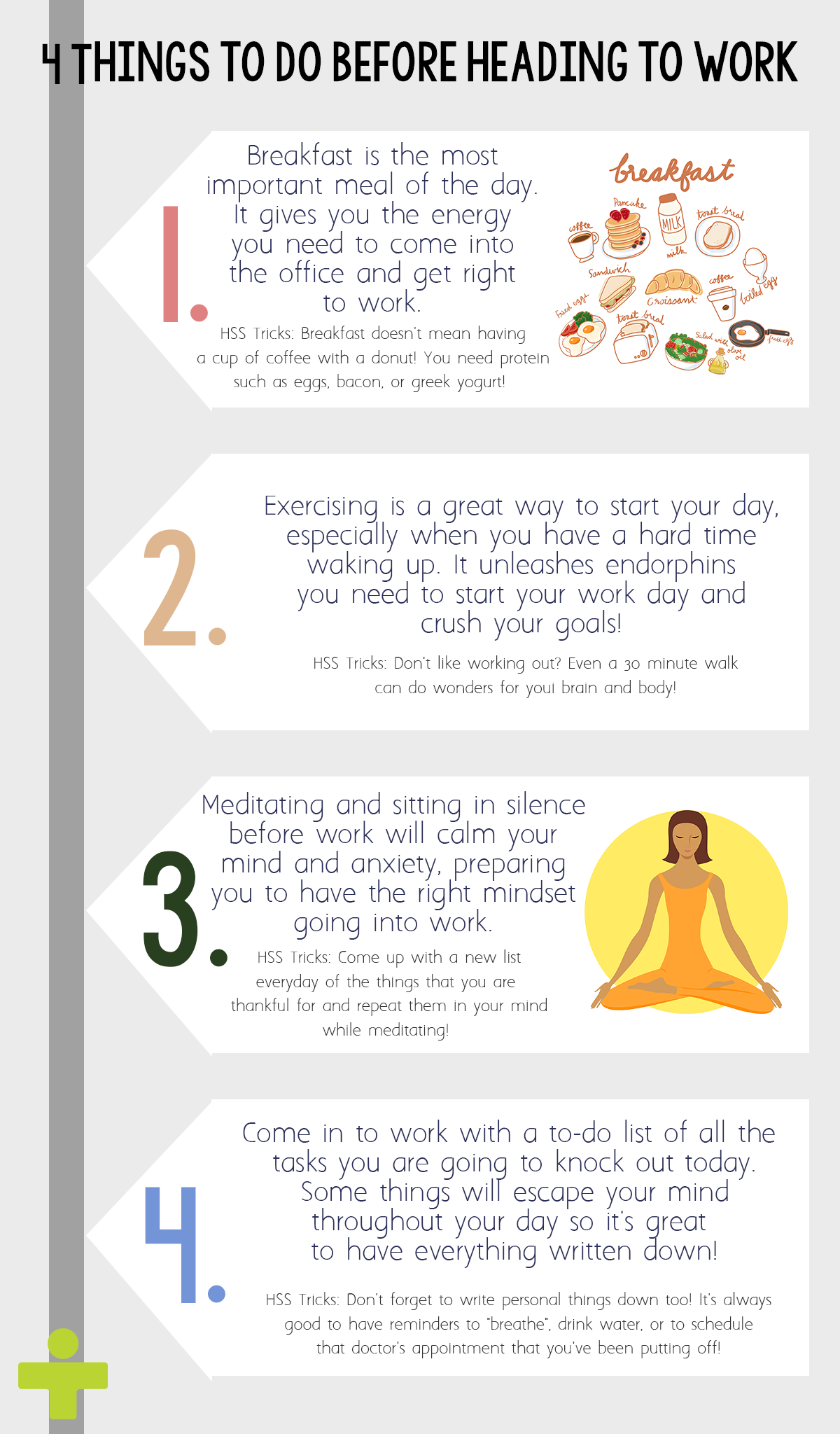Those pesky, bad work habits are hard to quit. No day like today to start breaking them!

Whether you’re a new grad or you’ve decided to look for a new position, congratulations on the new adventure you’re starting! Not only can this be a really exciting time for you, but it can also be a bit stressful. Full disclosure: this will be one of the toughest times in your life. Yes, there are tons of positions open all over the world, but you’re also in the same position as four million other people! Don’t get discouraged though! The time will come where you start going on interviews and then, finally, you’ll start your first job!
Starting your very first full-time job can be a little overwhelming. While it’s an exciting time because you finally get to start making your own money to save up for a new car, a house, a wedding, or just to start paying off your student loans, the unknowns can be a little stressful. Here are a couple of things I wish I knew before starting my first position:
Some people have their dream jobs right out of the gate and others will still be in school getting their Master’s. The worst thing you can do is compare yourself to them. You are not falling behind, and you are not way ahead, you are right on time.
That’s really the only way you are going to learn. You’re not going to learn anything by being perfect. The worst thing you can do is get angry with yourself. Forget the mistake, remember the lesson and move on.
Starting a new job can be intimidating and so can the people around you. When you start your first workday, try to introduce yourself to as many people as possible. Remember people’s names and make an effort to start a conversation. The friendlier you are, the more comfortable you and your coworkers will be.
Whether it be a team outing, helping a coworker, or grabbing lunch with your boss, always think about the possible positive outcomes – you could be surprised where it takes you. “Our lives are defined by opportunities, even the ones we miss.” Eric Roth
There is no shame in making your office or cubicle feel a little more like home. Grab some picture frames or an inspirational quote and put it on your desk. You’ll spend 40 hours a week in that space, you might as well spice it up with things you like. AND it doesn’t hurt to keep it clean.
Whether it be work related or personal, it’s important to set goals. Goals are like plans that help us break things down into doable tasks. Too often we celebrate finished products and not all the little tasks we completed that got us there. Allow yourself the gratification of completing all these tasks, you’ll be surprised how accomplished and motivated you feel.
You are not alone if starting a new job stirs feelings of anxiety and fear. Be confident in your skills, remember they hired you and trust the process. For help with resume writing, preparing for your interview, negotiating salaries, and more subscribe to our blog.
There’s so many things to do to get yourself in the right mindset before you head off to work!

In just about every interview, you can expect to be asked, “Where do you see yourself in 5 or 10 years?” A generation ago, we used to know… You get a job in your twenties, work hard to get raise after raise, get promoted once or twice, and then you retire. Nowadays, people don’t know. They get bored with one company and then jump to the next one, looking for something that’s new and challenging, sometimes even returning to school for a complete career change. An unclear path like this makes it hard to create a career vision and figure out where you actually see yourself in 10 years. Hiring managers understand this jump-ship mentality and it’s why almost every hiring manager asks you this question.
Let’s dive in and help you take control of your own future.
In order for you to grow in your career, you also need to grow your skillset. Try to learn something new every day. Find people who have similar roles to you and take a look at their skills. What are they doing that you can’t?
Take the time to build relationships with people in the business world. This could open many doors for you down the road. It’s also nice to have a lot of people in your corner rooting for you to succeed. The more connections you have, the more possibilities there are. Use them to your advantage.
For example, if there’s an opening in upper management and you want the position, what do you do? Go to your supervisor and tell them why you should be considered for the role. Don’t tell them why you should have the role. Explain why you should be considered, use statistics, explain your experience, and share your accolades. Don’t risk being looked over for the position because you didn’t say something.
Write a list of all the things you love about your position to keep you motivated. Then, write a list of things you’d like to be doing down the road – skill wise. Chances are you could find that in with your current company. Maybe you’d like to lead a team- create a target and work towards it.
Consider your comfort zone a small circle around you using the skills and connections you’ve had for years. Now think of all the skills and connections outside of that small circle that you are missing out on. Live life to the fullest and try to be a “yes man”. You never know what could come out of going outside your comfort zone.
Figure out where you want to be, what direction you want to go in, and what you want to be doing (what’s your 10-year plan). Only you can control your future.
Temporary employment has seen tremendous increase over the past few years, especially in healthcare. Many industries, including retail and healthcare, experience increased personnel needs several times a year, be it for a special assignment, auditing or due to a seasonal increase in business.
Although it’s common to first see the cons in a temporary position, there are some very strong positives to keep in consideration. Temporary employment allows you to get a feel for or “test drive” a company and/or position. This type of employment can also offer the opportunity to pick up new skills that were not available to you in your past position. Another perk to a temporary job comes in the connections you will make. Getting the opportunity to work a temporary job alongside a professional you admire or for a highly sought-after firm will allow you to expand your contacts and build professional and personal connections that could provide solid references or suggest you for a future permanent opening.
Now that you know the vantage point of temporary employment, let’s look into ways you can use a temporary assignment to land a permanent position:

Be a successful temporary employee and show them why they need to hire you permanently. Treat your temporary position as a permanent one because managers look for quality workers that are committed, hardworking, and passionate about what they do.
Carpe diem! Seize every opportunity you get to better yourself – whether that be staying extra after work helping someone with their patient or arriving a few minutes early to help the administrators. Make it your mission to come in everyday and learn something new, whether that be in your job description or outside it. There is never such thing as too much growth and knowledge.

Teamwork skills are very important skills to build and maintain. Not only does it improve your relationship with your coworkers, but it also shows everyone that you have what it takes to work alongside them permanently. Your coworkers just might become your promoters when a permanent position becomes available.

This is probably the easiest thing to do, but is often overlooked. It’s important your manager and recruiter know you are serious about this position and want to be hired full time. Show them you are dedicated and motivated to fully be a part of the company. It doesn’t hurt to show them how you’ve impacted the company during your assignment either!
At HealthCare Support, we strive to be one of the most trusted employment partners in our industry. But, we aren’t only concerned with the quality of services we provide to our clients – we also take pride in providing a great place for our employees to work and a culture that they want to be a part of. Indeed, one of our core missions is “Shaping futures for individuals and their families.”
Our employees have come to learn this firsthand, as well as all the health care professionals we place in jobs. However, we also think the same way about our community here in Orlando. We are in a great position to be a positive force in our local community, and our service-based culture extends into many volunteering efforts.
Throughout the year, our Internal Development Team rallies our employees around several charitable causes. One of our favorite things to do is participating in various races and walks to raise money. Just last month, we were able to raise $12,000 for the American Foundation for Suicide prevention at the “Out of Darkness Walk.” We also had the privilege of sending several volunteers to the Florida Citrus Sports 2018 “Feast on the 50” at the Camping World Stadium. There, our employees helped raise money for disadvantaged children in the community surrounding the stadium.
Another thing we love to do is collecting food and supplies for different drives. We participate annually in the A Gift for Teaching School Drive, rounding up boxes of necessary school supplies like crayons, notebooks, pencils, markers, and scissors for needy students. And, as Florida residents who understand the devastating effects of hurricanes, we raise hurricane relief supplies for those most in need whenever the situation calls. Most recently, our team collected essentials like diapers, toilet paper, paper towels, food, and clothing for those affected by hurricane Michael last year.
Every deal we make, every professional we recruit, and every new person we hire allows us to have more of an impact around us. If you are looking for your next job in the healthcare industry, let us help! To get in touch with us, you can call 407-478-0332.
For those in the healthcare industry, interacting with patients is likely a key part of what you do every day. Though some like nurses and general practitioners see more of the patient than surgeons or anesthesiologists, anyone involved with healthcare needs to have the interpersonal skills to relate to their patients. After all, the whole purpose of healthcare is to administer to the sick and injured, and the relational aspect is no small piece of that. Here are some things to do, and not to do, every time you meet with a patient.
HealthCare Support can help talented, passionate healthcare professionals find the perfect long-term or short-term job. Our professional network is vast, and our dedicated team can help place you in the ideal situation for your career. To learn more about our open jobs and services, please give us a call at 407-478-0332.
You have an open position in your company, you put out a detailed job description online and in comes numerous resumes. You pick your top prospects and you’re ready to interview them. Our question is, what do you look for in the ideal candidate? You obviously want someone with the background and experience, but there are other factors that come into play. So, what are some key qualities you look for in an interviewee? Funny you ask, they all start with P’s!
The ideal candidate has the right experience for the job, but do they have the passion and enthusiasm? There’s a quote that says, “Choose a job you love, and you’ll never have to work a day in your life.” You’ll want to hire someone who is excited about the opportunity and puts a little zest into everything they do.
When you hire someone, that person should be someone who you think you can get along with. You’ll spend 40 hours a week with each other and it will drive you crazy when the person you’re talking to is spineless. It’s like talking to a wall! Find someone with a sense of humor and good character.
No Negative Nancies! It’s hard enough to succumb to the rumors and gossip around the office, but when your coworker bashes other employees, talks trash on other companies, or complains about everything they do, it gets frustrating. Positive employees make for peaceful and fun workplaces. Plus, positivity rubs off on other people!
Being a team player is a key quality to look for in an ideal candidate. There are many situations where people will have to work with others for group projects. Being a team player and teamwork motivates unity in the workplace and promotes workplace synergy.
Look into the future. Where do you see these candidates in a couple months from now? A couple years? It’s important when hiring a candidate, you look for long term potential. Do you see them impacting the company positively in the next 6 months? You also must ask yourself if they are committed to the company and the position. Look into their past positions and see how long they stayed with their past companies.
When looking for the ideal candidate, there are a lot of things to consider. First impressions make final decisions. So, candidates, just be your best self. And clients, hire someone that brings a lot to the table. Don’t just hire someone for their experience.
I sent an email earlier today, but didn’t receive a response yet. How long do I have to wait, to send a follow up email?
Generally, all emails are answered within 24 hours of receipt. However, during high volume periods, the emails will be answered within 48-72 hours of receipt.
I am no longer employed with you, do I still have access to Paycor?
Yes, you still have access. As long as you registered within 1 year of your end date, you will have access to view and print any documents (including your W-2, when available).
When will W-2s be available?
W2s will be mailed out by January 31st.
How can I get an electronic copy of my W-2?
By January 31st, W-2s will be available online by going to www.paycor.com. If you are not registered with Paycor, you can do so by clicking the ‘Register Here’ link at the bottom of the sign in box. The access code is 82236 and follow the prompts.
Trouble registering? Send an email to support.
It’s after February 22nd, where is my W-2?
Send us an email. Include your full name (at the time of hire), date of birth, and last 4 of your Social Security number and the support team will be able to assist you further.
I don’t remember my username and/or password to Paycor, what do I do now?
Send us an email along with your full name (at the time of hire), date of birth, and last 4 of your Social Security number and the support team will be able to assist you further.
I need to change the address on my W-2, how do I do that?
Send us an email along with your full name (at the time of hire), date of birth, and last 4 of your Social Security number and the support team will be able to assist you further.
I contacted Paycor and they will not help me with my questions/issues, who do I contact?
Send us an email. Include your full name (at the time of hire), date of birth, and last 4 of your Social Security number.
You’ve finally earned your nursing degree, passed the licensing test and landed your first nursing job. Congratulations! That’s no small achievement. However, as you are likely aware, the real working world can be somewhat different from the classroom. Below are just a few tips that will help you make that transition from student nurse to working nurse.
. Many nursing educators agree that having a passion for nursing is what sets the truly gifted nurses apart from the rest. As you develop your career never stop learning and seeking new ways to be your best. Be willing to put in the time and extra hours to excel.
No day is ever like another in nursing, and the best nurses are those who can adapt easily and “think outside the box.” Nurses need to be able to quickly evaluate a situation and see how it relates to the patient, his or her family and even to the community as a whole.
. Few industries have added more technology in the past decade as health care. Even as a brand new nurse, you’ll not likely be familiar with every way that new technology can make your job easier. From online training classes to apps that allow you to interact with patients, make sure to be open to these time-saving and beneficial new products as they are introduced.
. The best way to learn about your new career is to tap into the hard-earned knowledge and experience of someone who has worked in your job for years. Look for more experienced nurses or nursing supervisors to take you under their wings. These people can be found at work as well as at networking events and within professional associations.
To learn more about succeeding in your new nursing position and to investigate other nursing employment opportunities, visit healthcaresupport.com.